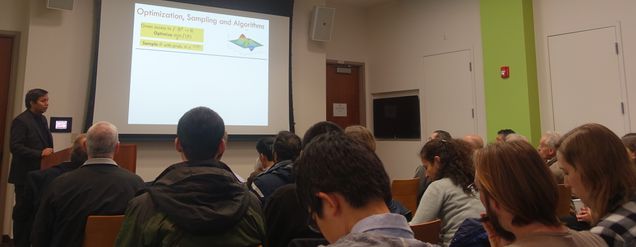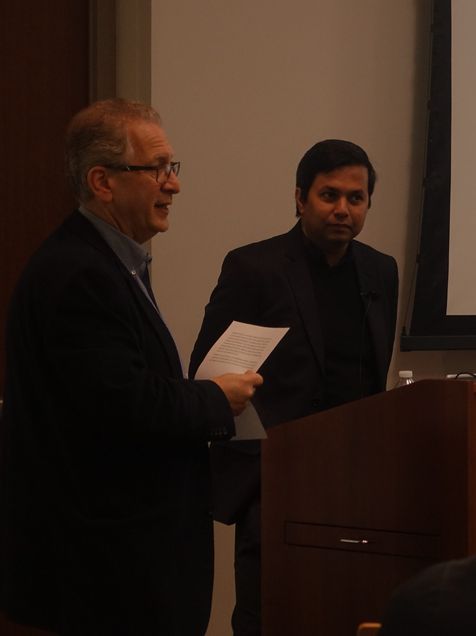Nisheeth Vishnoi gives DSI Distinguished Lecture on Algorithms, Nature and Society
Nisheeth Vishnoi, professor in the School of Computer and Communication Sciences at École Polytechnique Fédérale de Lausanne, focuses his research on both foundational problems in algorithms, complexity and optimization, and on how computation can be used to gain insight into processes in nature and society. Recipient of the Best Paper Award (FOCS 2005), IBM Research Pat Goldberg Memorial Award (2006), Indian National Science Academy Young Scientist Award (2011) and IIT Bombay Young Alumni Achievers Award (2016), Vishnoi’s work explains how our lives are being touched by powerful algorithms capable of learning about our behavior and consequently influencing it.

During his recent Data Science Initiative Distinguished Lecture, Vishnoi explained that while artificial algorithms have only recently dominated our lives, nature has been running in algorithms for billion years, as animal behavior has always been affected by external parameters. By understanding natural algorithms – such as optimization, the structure of natural data, and the interactions between human beings and artificial algorithms, we can better understand how they impact human behavior and dynamics.
Vishnoi demonstrated how organisms, such as a single cell slime mold, react to specific food placement in an enclosed environment. The slime mold performs an internal computation then chooses to live on the shortest path to the food, similar to the iteratively reweighted least squares algorithm, demonstrating surprising connections between the natural and artificial world.
 During his presentation, he then turned towards algorithmic bias in data summarization. He explained how, for example, the Google Image algorithm returns the search result for “scientist,” a small subset from billions of images, which results in a systemic misrepresentation of gender. Not only can these misrepresentations distort human perceptions, but deep learning algorithms also use these images to train their networks. Humans determine these algorithms and choice of the subjective function, as data can have sensitive types such as gender, skin color, and race; however, vectors cannot capture this. Fairness and diversity are not equivalent, Nisheeth explained, as there are many metrics to measure fairness, and as goal is not to misrepresent, functions may not be fully optimized. Vishnoi proposed a number of optimization solutions to address this, such as adding constraints for data distribution, which gives the data a “balanced” property, while also making the price of fairness small.
During his presentation, he then turned towards algorithmic bias in data summarization. He explained how, for example, the Google Image algorithm returns the search result for “scientist,” a small subset from billions of images, which results in a systemic misrepresentation of gender. Not only can these misrepresentations distort human perceptions, but deep learning algorithms also use these images to train their networks. Humans determine these algorithms and choice of the subjective function, as data can have sensitive types such as gender, skin color, and race; however, vectors cannot capture this. Fairness and diversity are not equivalent, Nisheeth explained, as there are many metrics to measure fairness, and as goal is not to misrepresent, functions may not be fully optimized. Vishnoi proposed a number of optimization solutions to address this, such as adding constraints for data distribution, which gives the data a “balanced” property, while also making the price of fairness small.
Boston University’s Data Science Initiative (DSI) seeks both to leverage BU’s existing strengths and further expand its capacity to compete and lead in the Big Data revolution. At the core of DSI is an effort to recruit some of the world’s finest interdisciplinary faculty with proven track records in data science and strong potential for long-term impact at BU and beyond. Anchored at the Hariri Institute for Computing and Computational Science and Engineering, the Initiative supports the hiring of a cohort of faculty members who complement and expand BU’s footprint in data science research.
[Read more about the Data Science Initiative]